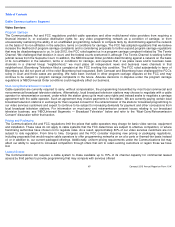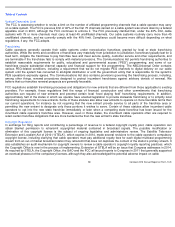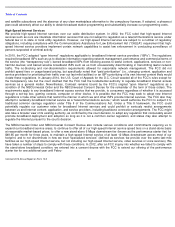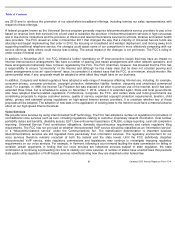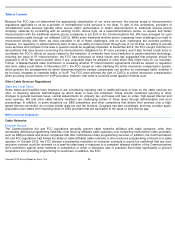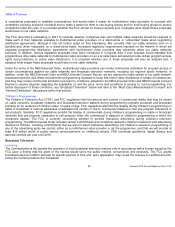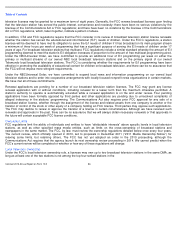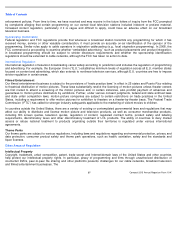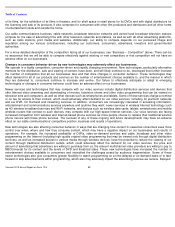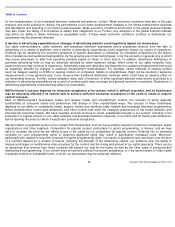Comcast 2013 Annual Report Download - page 31
Download and view the complete annual report
Please find page 31 of the 2013 Comcast annual report below. You can navigate through the pages in the report by either clicking on the pages listed below, or by using the keyword search tool below to find specific information within the annual report.
Table of Contents
local television stations with exclusivity protections in their markets for network and syndicated programming. Legislation has been
introduced that would eliminate both must-
carry and retransmission consent as well as more narrow legislation that would aim to
resolve impasses in retransmission consent negotiations. We cannot predict what new laws or regulations, if any, may be adopted
or how any such laws or regulations would affect our businesses. Multichannel video providers may also invoke commercial
arbitration under rules established in the NBCUniversal Order to resolve disputes regarding carriage of our owned local broadcast
television stations.
Internet Distribution
Under the NBCUniversal Order and NBCUniversal Consent Decree, we are required to make certain of our cable network,
broadcast television and filmed entertainment programming available to bona fide online video distributors in certain circumstances,
and they may invoke commercial arbitration to resolve disputes regarding the availability, and the price, terms and conditions of
access to such programming. In addition, we are required to continue distributing programming via nbc.com that is generally
equivalent to the programming that we distributed via nbc.com as of January 1, 2011, on generally equivalent price, terms and
conditions, so long as at least one of the other major broadcast networks continues to distribute its programming in a similar
fashion. We are one of three broadcast network owners of Hulu, but we were required to relinquish all voting rights and our board
seat in Hulu in connection with the NBCUniversal transaction. In compliance with our obligations under the NBCUniversal Order
and the NBCUniversal Consent Decree, we have entered into renewal license agreements with Hulu on substantially the same
terms as its other broadcast network owners.
Broadcast Spectrum
In February 2012, Congress authorized the FCC to conduct an incentive auction to reassign a portion of the broadcast spectrum for
mobile broadband use. Under the statute, broadcasters may voluntarily relinquish some or all of their spectrum rights in exchange
for a share of the proceeds of the FCC’
s auction of the spectrum to mobile broadband providers. Broadcasters that do not
voluntarily relinquish their spectrum rights may still be affected as part of the process of clearing and repacking the spectrum for
future mobile use, but Congress required the FCC to make “all reasonable efforts” to preserve broadcasters’ over-the-
air coverage
area and population served, and to reimburse those broadcasters’
reasonable costs. The FCC currently is conducting a proceeding
to implement this statute, including establishing processes for how the spectrum will be repacked and how the broadcasters will be
reimbursed for relocation costs. We cannot predict whether or how any such regulations might affect our businesses.
Indecency
A federal statute and FCC regulations prohibit the broadcast of obscene material on television stations at any time and indecent or
profane material between the hours of 6 a.m. and 10 p.m. Broadcasters risk violating this prohibition because the vagueness of the
relevant FCC definitions makes it difficult to apply. Moreover, the FCC has in some instances imposed separate fines for each
allegedly indecent “utterance,”
in contrast with its previous policy that had generally considered all indecent words or phrases within
a given program as constituting a single violation. The maximum penalty for broadcasting indecent or profane programming is
$350,000 per indecent or profane utterance.
Indecency regulation has been the subject of recent court review, regarding both the FCC’s “fleeting expletives”
policy and the
FCC’s definition of what constitutes indecent material. In June 2012, the U.S. Supreme Court struck down the FCC’
s assessment of
indecency fines against ABC and FOX on the grounds that the agency failed to provide fair notice of its standards and enforcement
policy. However, the court declined to rule on the constitutionality of the FCC’
s indecency policy under the First Amendment. This
ruling may result in the FCC’s clarification of its policy and changes to how it approaches future indecency-
related enforcement
actions. In this regard, in April 2013, the FCC sought public comment regarding its indecency
Comcast 2013 Annual Report on Form 10
-
K
26



